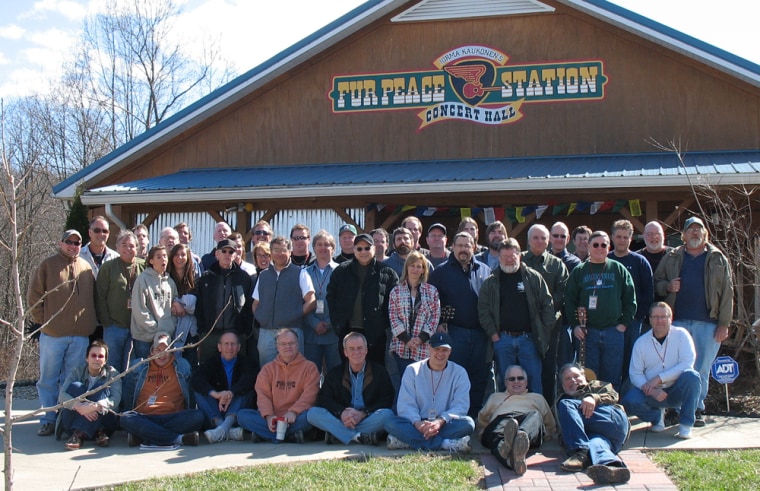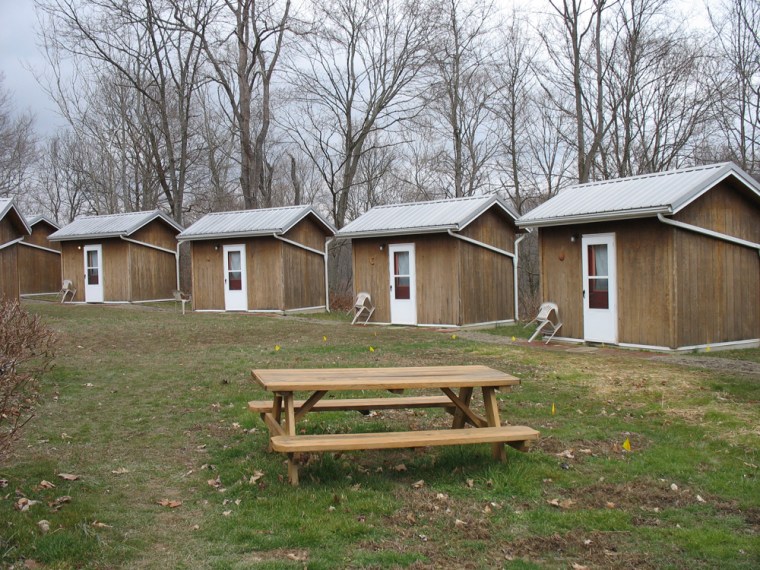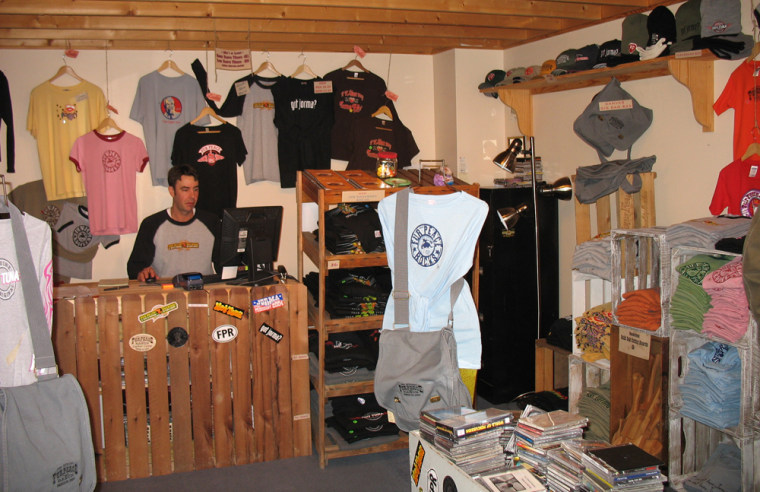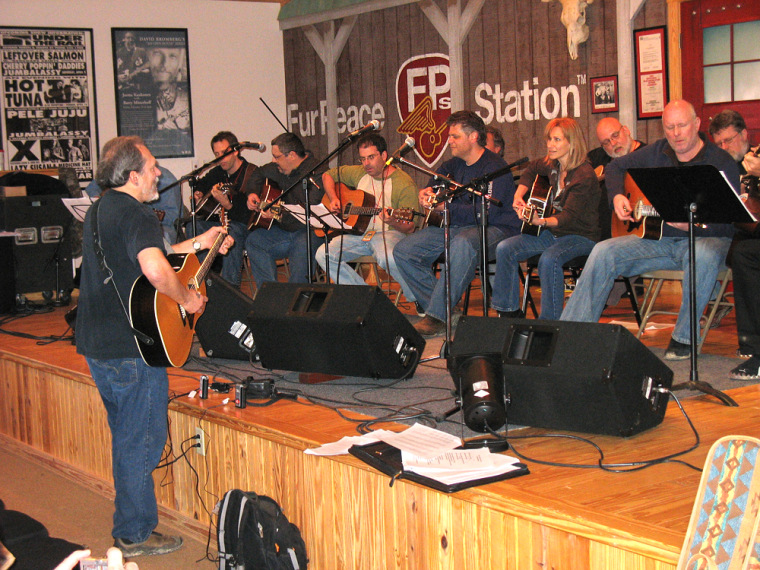At most camps, they sit around and sing “Kumbaya.” At the , they’re more likely to sing “Baby, Please Don’t Go” or “Nine Pound Hammer” or just about anything by the Rev. Gary Davis.
Located in the hilly farmland of southeastern Ohio, about two hours from Columbus, the Ranch was not created as a place for kids to hold potato sack races but rather for adults to polish their guitar and music skills. Dreamed up by world renowned guitarist and his wife Vanessa as far back as 1989, the camp has gradually evolved since then into an oasis for pickers who can escape their jobs and families for a long weekend as they indulge their fretboard fanaticism while eating well and making new friends.
I recently attended the camp on a chilly March weekend. As most guitar heads know, Jorma has a long and distinguished history in the field. As the lead guitarist of Jefferson Airplane, he helped to create a sound and to define an era. The Airplane reached its highest altitude in the late ‘60s and early ‘70s, a period during which it played at such seminal rock events as the Monterey Pop Festival, Woodstock and Altamont. During that era, Jorma and his good friend and Airplane bass player Jack Casady formed a splinter group called Hot Tuna, which still performs today.
Jorma’s first love was the blues, especially the acoustic variety best sampled with fingers. He learned to fingerpick while a college student in the early ‘60s, when he became enthralled with the music of the late Rev. Davis, a blues-gospel great who influenced such performers as Bob Dylan and the Grateful Dead.
Now fingerstyle devotees far and wide seek out Jorma’s tutelage at the Fur Peace Ranch. Many of them make return trips, such as Frank from Toronto, a longtime Airplane and Tuna aficionado who has attended the camp several times and travels there in a vehicle dubbed the “Jefferson Campervan.”

Then there’s myself, at the far, far, far other end of the guitar spectrum from Jorma and his regular students. A beginner to the guitar but with no experience at all at fingerstyle, I nevertheless forged ahead and signed up. I was assigned to a beginner’s fingerpicking class with Happy Traum, a longtime folk/blues singer-guitarist and a friend and contemporary of Bob Dylan. Traum spends most of his time these days teaching and performing when he’s not running a company called Homespun, which makes instructional videos for all types of musical instruments.
At guitar camp, as in life, quite often our greatest fears never come to pass. I was somewhat apprehensive and a bit intimidated at the thought of taking a class with a bunch of players who would be Chet Atkins to my Barney Fife. But it wasn’t like that. The camp in general is warm and welcoming, and so was my class. Happy is a patient man and I got the impression he’s seen all types of students, including those as inept as me. And there were students at varying levels of the beginner’s category in my particular class who were just there to learn whatever they could and then take whatever knowledge they obtained home to practice it later.
The camp, located in Pomeroy, runs from March through October. My weekend was typical of most. Jorma teaches a group of about 15 students inside one cabin that is adorned with old Jefferson Airplane and Hot Tuna posters and stills. Happy’s class was held in the cabin next door. Casady taught bass guitar in another studio. And singer-songwriter Mary Gauthier conducted a songwriting class in yet another building. There are other classes scheduled on other weekends, including an electric blues class with G.E. Smith (formerly the leader of the “Saturday Night Live” band), a mandolin class with Barry Mitterhoff (who also tours with Hot Tuna), country blues with Roy Book Binder, jazz guitar with Larry Coryell and a keyboard class with Pete Sears. David Bromberg is also set to teach a deluxe “Bromberg” weekend.
A day at the camp usually consists of breakfast, followed by a morning class session of about two hours, followed by lunch, then an afternoon class, then dinner. On Friday night — weather permitting — there is often a campfire jam, where students can trade licks and compare musical notes.
On Saturday night, there is a concert inside Fur Peace Station, a 200-seat concert hall on the premises; students can grab seats in the first couple of rows, and the rest of the hall is filled by the general public. On my weekend, Jorma and Jack performed a scintillating set as Hot Tuna Duo, followed by Gauthier, who had a self-deprecating country charm to go with a crisp and rousing cache of original compositions.
On Sunday, more eats and instruction. Then the afternoon brought the student performances. The show is open to anyone who wants to perform, and nobody is pressured to do so. Jorma’s pupils took the stage first to perform “Keep On Truckin’” as a group, a song they worked on together in class. That was followed by smaller acts, and even though most if not all were amateur musicians, they were surprisingly adept and enjoyable. I did my part by snapping photos while they played, all the while promising myself that, if I practiced hard, I would return someday and snap even better photos.
Later on Sunday evening, both Happy and Marjorie Thompson, Jorma’s teaching assistant who is also a singer-songwriter and fingerpicking maven as well as the dean of the biology department at Brown University, put on a show for the students. Happy has two distinct personas: guitar academic and folk/blues demon. Both he and Thompson left us students with the harsh realization of how little we knew, but also with the promise of the possibilities that lie ahead.
Most of the students who attend weekends at the camp stay in small cabins that accommodate two people and are heated in winter and air-conditioned in summer. There isn’t much room to have pillow fights or play “Twister,” but they’re fine for sleeping. Campers spend little time there anyway; most play guitar either inside the larger cabins where classes are held, or out on the long front porches. Showers and toilets are situated in a separate building a short walk away from the cabins.
For those who would rather stay elsewhere, the camp offers a list of local hotels and motels, most of which are only 15 to 20 minutes away. I stayed in nearby Athens at the Ohio University Inn, about 15 minutes up Route 33, and it was no trouble at all, although newcomers might miss the highway turnoff the first time through, as I did.
It should also be noted that there is a strict policy forbidding drugs, alcohol and guns. Yes, guns. Apparently the state of Ohio has a law that allows citizens to pack heat, but the Ranch has signs posted countermanding that order within its confines.
The food is tasty and there’s plenty of it. Students are summoned by a member of the kitchen crew blowing loudly into a conch shell. Usually there is a continental breakfast, with fruit, muffins, bagels and lox. Lunches feature lots of salad along with an entrée, usually chili or a hamburger. Dinners can be anything from roast chicken to pasta to steak, with lots of sides. And there are usually snacks laying around all day for those with insatiable sweet teeth along with coffee and tea.

Weather can be an issue. The early March weekend prior to mine saw temperatures around 70. Jorma told me he was riding his motorcycle only a few days earlier. But when I arrived, so did Jack Frost, with temperaturess plummeting into the 30s. It didn’t put a crimp in the weekend at all. The only drawback involves the setting. The camp extends for acres beyond the cabins, and it’s the kind of picturesque country serenity ripe for sitting on a bench along a leafy trail and picking a guitar. It’s just a little difficult to do so when you have to keep warming your fingers.
But you may not have much of a choice. Classes are announced in the fall and they fill up fast. The class you desire may not be offered in the relative warmth of June, or you may have to take your second choice in March or October. The Fur Peace Ranch also occasionally has special weekends, such as one for couples and another for motorcycle enthusiasts.
The staff is comprised of folks who remember your name throughout the weekend. John Hurlbut, the camp manager, is particularly accommodating. He does just about everything — from taking tickets at the Saturday night concerts to slinging mashed potatoes and veggies at dinner — and does so with a smile. I even asked if he could do something about the weather, and sure enough on Sunday morning it cleared up. Jorma’s wife Vanessa, who runs the operation as CEO, usually is around during camp weekends, but on my stay she was away in China to pick up a baby the couple is adopting.

In one of the larger cabins — the only two-story edifice on the premises — the downstairs is split between classroom space and the company store, which was probably the second most-popular venue besides the dining hall on my weekend. Lots of students milled about in there all weekend, buying souvenirs as well as instructional videos and rare blues and country CDs; Thunder Mike Coyne keeps a running tab for each student, and then everyone settles up on Monday. Upstairs consists of a library that has lots of music-related books and videos for students to peruse during down time.
Naturally, the focus of the weekend is guitar. From an instructional standpoint, it’s an intensive, and one of my worries was whether I could digest all the information thrown at me and be able to use it later. That’s where copious notes come in, along with handouts that Happy and other teachers provide. But it’s also helpful to bring a good audio recorder with you (video recorders are not allowed). I made the mistake of bringing a cheap digital hand-held audio recorder, and it filled up way too quickly.
It also helped greatly to have generous classmates. Everybody was easy going about sharing what they knew, and offering help or advice when I didn’t understand something, which was often. All in all, I think I left the place a little smarter about the guitar than when I arrived, and a lot more aware of how much more practice I needed to put in.
Just a note about the guitars themselves: Most people bring their own, but the camp does have a couple to rent. Since I was flying from Los Angeles and changing planes, I found renting to be the easier way to go this time. Most students drove to camp from places in the East, and brought their own guitars, many of which were Martins, Taylors and other top-notch brands (these are serious players, folks). For those who didn’t drive, some airlines allow passengers to carry on guitars and some don’t. In case you get to the gate and are told you have to check your guitar, make sure to have it in a secure hard case that can handle the challenges presented by airline baggage handlers. There is also UPS, although that can get costly. Make sure and inquire about your guitar transport options before finalizing your plans.
Before I left on Monday to head back to the Columbus airport, where I would be pulled aside and lectured by an overzealous security drone about which toiletries needed to be put in a plastic baggie and which didn’t, there was a half-day session of breakfast, followed by a one-hour class that served as a review session. Then I said good-byes to teachers, staff and fellow campers, which was as sad as it was leaving camp as a kid, but also pleasurable knowing that if I practice enough they might actually allow me to return.
Maybe someday I might even be able to fingerpick “Kumbaya.”
